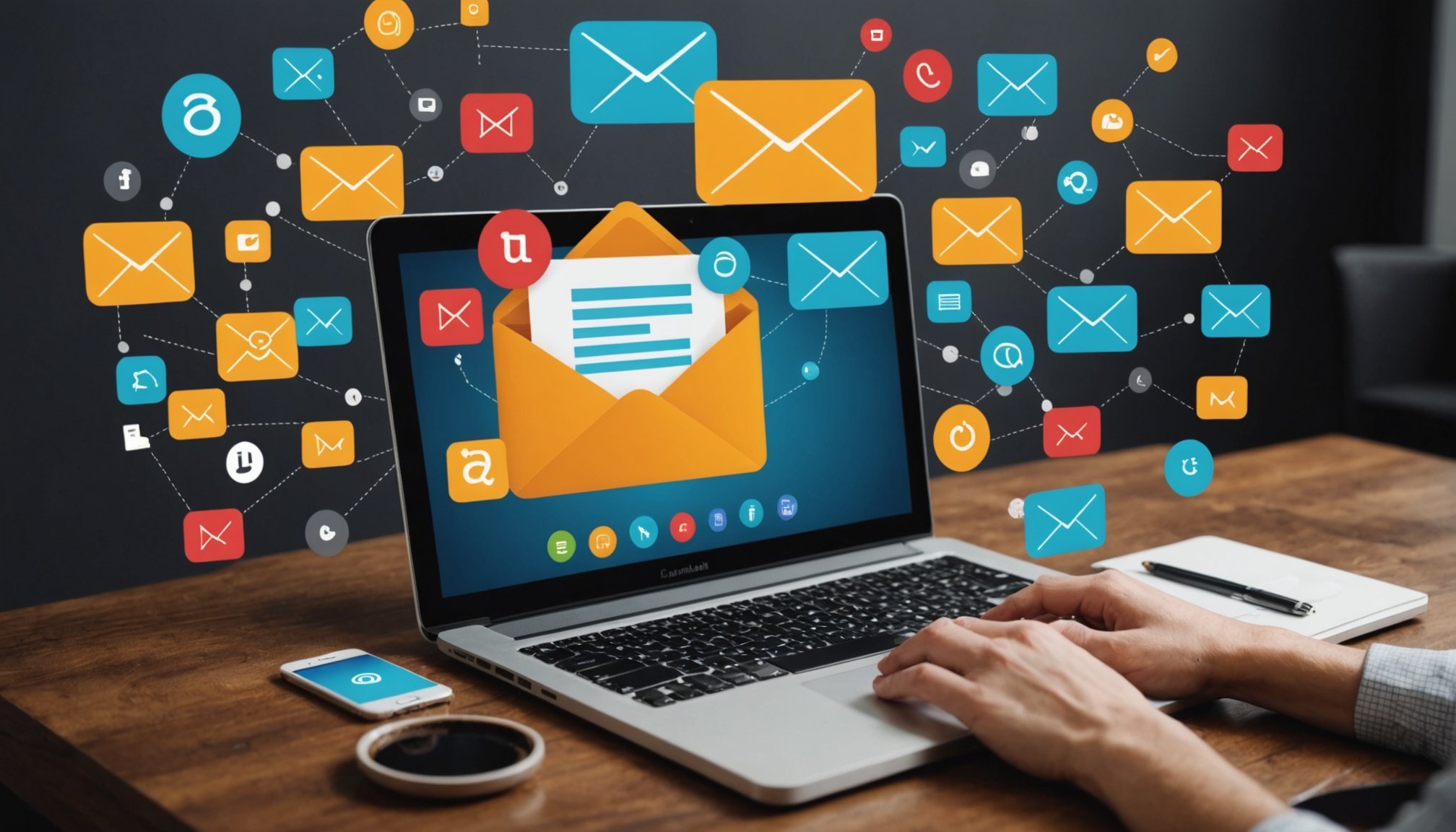Understanding Email Marketing for Small Businesses
Email marketing has become a cornerstone for small businesses, especially within the UK, aiming to build a robust connection with their audience. At its core, email marketing basics involve crafting engaging content that resonates with readers’ needs and encourages them to take action. For small businesses, this is crucial in expanding their reach and fostering customer loyalty over time.
Implementing effective small business strategies via email can result in impressive statistics. Studies indicate that email marketing brings an average return on investment (ROI) of £42 for every £1 spent, showcasing its potency. This cost-effective platform allows small businesses to deliver personalised promotions, updates, and news directly to their customers’ inboxes, ensuring high visibility.
In parallel : Revolutionizing energy: vallourec smart tubular solutions
However, navigating email marketing isn’t without its challenges, particularly due to UK-specific regulations like the General Data Protection Regulation (GDPR). Compliance requires obtaining explicit consent from recipients before sending marketing emails, emphasizing transparency in collecting and using personal data. Understanding these regulations helps businesses avoid hefty fines while maintaining trust.
Adopting the right email marketing basics and strategies tailored to small businesses in the UK not only enhances customer engagement but also significantly boosts conversion rates and ROI, proving invaluable in the current digital landscape.
Also to read : Empowering change: key factors driving digital transformation in uk higher education
Building a Quality Email List
Creating a robust, quality email list is crucial for successful marketing. One effective method to grow this list organically is through engaging content offers, such as free e-books or webinars, which attract subscribers genuinely interested in your service. Employing sign-up forms strategically placed on your website can also enhance list-building efforts by capturing interested visitors seamlessly.
Understanding the significance of audience segmentation cannot be overstated. By categorising your subscribers based on specific criteria, such as demographics or purchase history, you can tailor messages that resonate, increasing the effectiveness of targeted campaigns. Segmenting your audience allows personalisation, leading to higher engagement and conversion rates.
Managing and cleaning your email list regularly is essential for maintaining its quality. Tools like Mailchimp or Constant Contact offer functionalities that enable you to easily edit, update, or remove obsolete entries, ensuring that your communications reach only interested readers. By maintaining a clean list, you avoid deliverability issues and improve the overall performance of your email marketing campaigns.
Incorporating these strategies not only boosts the size of your email list but also enhances its quality, thereby optimising your marketing efforts. Efficient audience segmentation combined with strong list management supports a more precise, impactful communication strategy.
Crafting Engaging Email Content
Creating email content that captivates an audience requires both art and strategy. At the heart of successful campaigns lies compelling copywriting strategies. Start with an enticing subject line—consider this the gateway to capture your reader’s attention. Best practices suggest using numbers, questions, or time-sensitive cues that emotionally resonate with the audience.
Personalization is paramount in email content creation. Customizing emails with the subscriber’s name or interests boosts engagement. Moreover, ensuring the content is relevant and timely aligns with the recipient’s needs, adding value and increasing the likelihood of conversion.
Successful case studies in the UK highlight brands that effectively blend personalization with strategic content. For example, a retail brand saw a 30% increase in open rates by segmenting their audience and tailoring their message to various customer demographics. This case exemplifies how knowing your audience and speaking directly to their preferences creates impactful results.
In essence, effective email content combines creativity with data-driven decisions. By focusing on copywriting strategies that revolve around personalization and relevance, businesses can significantly enhance their email campaign outcomes. As you venture into email marketing, remember these insights to craft messages that don’t just reach inboxes, but resonate deeply with readers.
Utilizing Automated Email Campaigns
Automated email campaigns are a crucial tool for small businesses, offering a strategic way to enhance customer engagement and streamline communication. One effective approach is using drip campaigns, which involve sending a series of pre-scheduled, automated messages to subscribers. These campaigns nurture leads by delivering tailored content at opportune times, ultimately boosting conversion rates.
Small businesses have access to a variety of email automation tools that can simplify the creation and management of these campaigns. Services like Mailchimp, Constant Contact, and SendinBlue provide intuitive platforms to design, automate, and track emails effectively. The choice of tool depends on the specific needs of the business, such as budget and features offered.
Drip campaigns can be highly beneficial when aligned with customer behavior. By setting up automated responses triggered by customer actions, such as signing up or abandoning a cart, businesses can maintain a relevant and personal touch. Techniques for implementing this include segmenting email lists based on user interactions and personalizing emails with customer data to ensure the content meets the recipient’s interests and needs.
Strategically leveraging email automation in this way can result in significant time savings and increased customer satisfaction.
Analyzing and Optimizing Email Performance
Understanding and enhancing email performance is crucial for marketing success. Monitoring key performance indicators (KPIs) like open rate, click-through rate, and conversion rate enables you to evaluate the effectiveness of email campaigns. These metrics provide insights into how your audience engages with your content, helping to refine tactics over time.
Leveraging email analytics tools is instrumental in dissecting each aspect of your campaigns. Platforms such as Google Analytics and Mailchimp offer detailed reports, showcasing performance metrics that help identify strengths and weaknesses. With these insights, you can tailor your strategies to better meet your audience’s expectations.
Continuous improvement is a pivotal aspect of email marketing. By focusing on data-driven results, marketers can experiment with strategies such as A/B testing subjects and content variations. By closely analyzing the outcomes, adjustments can be made to maximize engagement and improve return on investment.
Some strategies include personalizing content, segmenting audiences, and optimizing send times. By continuously monitoring these performance metrics and applying data-backed changes, marketing professionals can ensure sustained campaign success. This proactive approach paves the way for creating impactful and engaging email campaigns that resonate well with recipients and drive desired outcomes.
Compliance with Regulations
Navigating GDPR compliance in the realm of email marketing can seem daunting, but understanding its fundamentals is paramount. This regulation, established by the European Union, mandates stringent data protection and privacy guidelines. Non-compliance with these laws can result in severe penalties, making it essential to stay informed.
The impact of GDPR on email marketing is significant. It requires businesses to obtain explicit consent from their subscribers before sending marketing emails. Simply put, consent must be an “opt-in” process, rather than an assumption. Additionally, subscribers should be able to easily withdraw their consent at any time. This compliance ensures trust and transparency in your communications.
Best practices for ensuring compliance include maintaining clear records of subscriber consent, regularly updating privacy policies, and including an unsubscribe option in every email. Ensuring GDPR compliance doesn’t just protect your business legally; it also fosters a positive relationship with your audience.
Ignoring GDPR compliance can result in hefty fines, potentially up to €20 million or 4% of your annual global turnover. Implementing a robust compliance strategy can help avoid these penalties and create a more effective and lawful email marketing campaign. Prioritising these practices ultimately safeguards your business and enhances customer trust.
Tools and Resources for Effective Email Marketing
Navigating the world of email marketing can be daunting for small business owners. Thankfully, a wealth of resources exist to ease this journey. In the UK, platforms such as Mailchimp, Constant Contact, and AWeber are particularly popular. These tools not only help streamline the process of creating and sending emails but also offer features like automation, analytics, and customer segmentation.
To enhance your email marketing skills, several online resources provide valuable learning opportunities. Websites like HubSpot Academy and Udemy offer comprehensive courses on email marketing strategies tailored for small businesses. These courses can help you understand how to optimise your campaigns for better engagement and conversion rates.
Finally, joining support communities and forums is a fantastic way to stay connected with fellow small business owners. The UK Business Forums and LinkedIn groups centred on marketing provide platforms where experiences and insights are shared. You can ask questions, share knowledge, and find encouragement from a network that understands the challenges you face.
Incorporating the right tools and resources can significantly impact the effectiveness of your email marketing campaigns. With the correct support, small businesses can elevate their communication to achieve greater success in an increasingly digital world.











